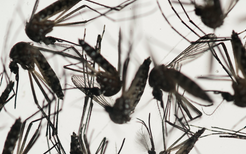WASHINGTON -- President Barack Obama's administration warned Congress on Wednesday that money to fight the Zika virus is on the verge of running out as Capitol Hill faces a political stalemate.
In a letter to key lawmakers, the secretary of Health and Human Services said the National Institutes of Health would exhaust its resources for vaccine development by month's end. The letter from Secretary Sylvia Burwell said that without additional money the second phase of clinical trials would be delayed, and Americans would have to wait longer for a vaccine.
The news comes as the first local transmissions of the virus have been found in Miami and authorities are warning pregnant women to stay away from the area. The virus can cause severe birth defects.
Congress gridlocked over Obama's $1.9 billion emergency spending request after House Republicans added language on Planned Parenthood and other matters that was unacceptable to Democrats. Then lawmakers left town for a seven-week summer recess and they won't be back until September.
Republicans have been downplaying the urgency of the matter, questioning why the administration has not spent more than $350 million already on hand, including money redirected from the Ebola fight. Burwell's letter gives a detailed accounting.
The Centers for Disease Control has $222 million available for domestic response including front-line assistance to states and localities. Of that, nearly $100 million will have been provided by week's end, and resources will be virtually exhausted by the end of the fiscal year on Sept. 30, the letter says.
The National Institutes of Health started Phase I clinical trials Wednesday of a DNA-based vaccine, with at least 80 healthy volunteers between ages 18 and 35 at three locations around the United States. The main goal of the study will be to evaluate the vaccine's safety and to see whether it generates an immune-system response in patients. If those early results are positive, researchers hope to begin a larger-scale trial in Zika-affected countries in early 2017.
"A safe and effective vaccine to prevent Zika virus infection and the devastating birth defects it causes is a public health imperative," Anthony Fauci, director of the National Institute of Allergy and Infectious Diseases, said in a statement. "NIAID worked expeditiously to ready a vaccine candidate, and results in animal testing have been very encouraging."
But without more funding, the second phase on that vaccine and others will be delayed.
Additional research and development also may be constrained as National Institutes of Health's $47 million in repurposed funding runs out by the end of this month.
"A delay in this stage of development will delay when a safe and effective Zika vaccine is available to the American public," Burwell wrote. "These examples demonstrate the urgent need for the administration's request for $1.9 billion in emergency supplemental funding."
Democrats blamed Republicans, and Republicans blamed Democrats and the administration.
Rep. Nita Lowey of New York, top Democrat on the House Appropriations Committee, said: "The urgency of enacting emergency Zika funding is growing by the day." She called on Speaker Paul Ryan to reconvene the House to act on a bipartisan Zika bill that had passed the Senate.
This week, authorities have been spraying insecticides in Miami's Wynwood arts district, where more than a dozen people have become infected with the first mosquito-transmitted cases in the mainland U.S.
Campaigning for re-election Wednesday in Doral, Fla., GOP Sen. Marco Rubio called for action and called it "inexcusable" that the administration is sitting on unspent funds. "Now, I don't like to ascribe motives, but in this case, I have to start wondering whether they are holding back on spending that federal money because they like making this a political issue that they can attack Republicans on," Rubio said.
Health officials warn the mosquitoes are proving harder to eradicate than expected.
For those with plans to travel to areas affected by the Zika virus, several major airlines said they were changing their policies on refunds and flight changes.
Spirit Airlines, American Airlines, JetBlue, Southwest Airlines and Delta all have made changes to how passengers can adjust their travel plans because of warnings about the virus.
The dates vary on when travelers have to meet deadlines to make the changes without facing penalties. Travelers are advised to check with the carriers.
Across the U.S., state's are already taking preventive measures against the mosquito.
In Texas, the state's Medicaid will begin providing mosquito repellent to all expectant mothers and women between the ages of 10 and 45. Women in the state program will be eligible to receive two cans of repellent a month through October, when Texas' peak mosquito season ends. The state is expected to spend about $12.6 million on the program.
New York Gov. Andrew Cuomo announced Tuesday that the state will offer a free chemical to kill mosquito larvae to stem the spread of the Zika virus.
New Orleans Mayor Mitch Landrieu said he's adding $500,000 to New Orleans' $3.5 million insect and rodent control budget. Landrieu also again urged Congress to pass the emergency spending bill to fight Zika.
Separately, Pentagon officials said Wednesday that more than 30 active-duty U.S. service members -- including a pregnant woman -- have contracted the Zika virus in countries where the disease has been identified.
Maj. Ben Sakrisson, a Pentagon spokesman, said the Defense Department has been tracking the Zika virus in men and women serving abroad since January, and that the number reached 33 this month. Pentagon officials did not name the countries where the service members contracted the disease.
Information for this article was contributed by Erica Werner, Nomaan Merchant and Janet McConnaughey of The Associated Press; by Brady Dennis and Dana Hedgpeth of The Washington Post; and by Helene Cooper and Matthew Hamilton of The New York Times.
A Section on 08/04/2016

